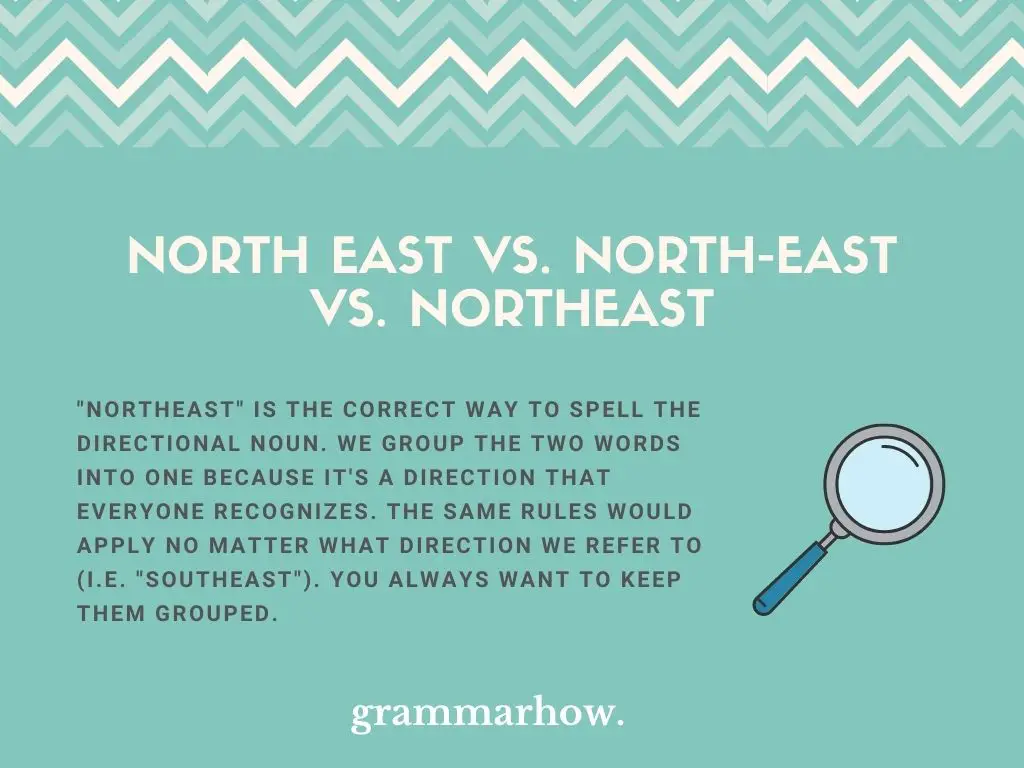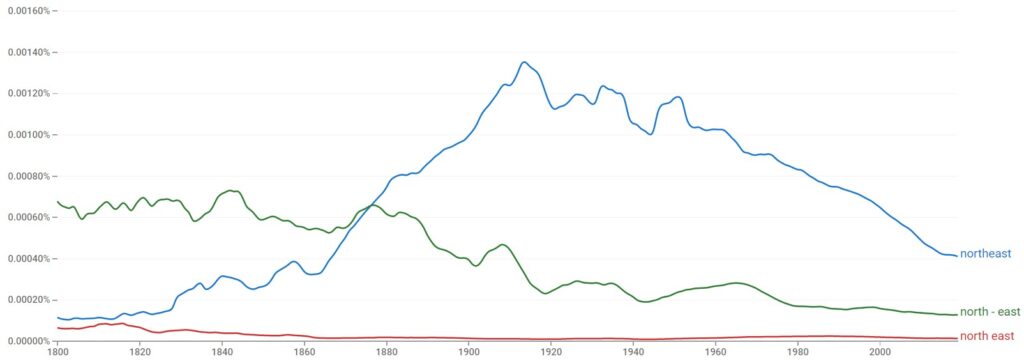“Northeast” is a directional noun. We write it whenever we’re referring to a specific direction. However, some people believe it’s hyphenated, while others believe it should be one or two words. This article will give you the definitive answer to help.
North east vs. North-east vs. Northeast
“Northeast” is the correct way to spell the directional noun. We group the two words into one because it’s a direction that everyone recognizes. The same rules would apply no matter what direction we refer to (i.e. “southeast”). You always want to keep them grouped.

According to Google Ngram Viewer, “northeast” is by far the most popular spelling variation. This makes the most sense since it’s the officially recognized spelling. However, you should note that “north-east” as a hyphenated form also sees some use.

In The Cambridge Dictionary and The Oxford Dictionary, “northeast” is defined as the most common way to spell the word. Both dictionaries combine the two directions into one whenever the “northeast” direction is mentioned.
The Cambridge Dictionary does not mention the hyphenated form at all. However, The Oxford Dictionary does make it clear that we can hyphen the phrase (and it appears to be more common in British English).
However, the evidence from the graph shows that there isn’t much difference regardless of which country uses the spelling. Instead, “northeast” is always the most popular choice, so it makes sense for you to stick to that whenever writing about it.
Is “Northeast” One Word?
“Northeast” is one word. It is officially recognized as such, so it would help for you to remember to write it in this form. While “north” and “east” are two separate directions, the direction “northeast” is also a direction, so we use it as one word.
If “northeast” wasn’t something that existed in English, we might find it more useful to hyphenate it or split the words. However, since everyone recognizes that “northeast” is the point between “north” and “east,” it becomes its own word whenever written.
Of course, it would help to see some more examples of it, so you can check them out below:
- They traveled northeast for as long as I can remember, and I can’t seem to find them anywhere now.
- What did you want to go to the northeast for? I didn’t think there was anything up there to interest you.
- Can we travel northeast now? I’m sure the map is telling us to go that way, but you’re ignoring it.
- The northeast is full of people that would be able to help us! Let’s just go up there.
Since “northeast” is a direction, we also write the words in a group. There is never a reason to split them up.
Is “North east” Two Words?
“North east” is never written as two words. While the two directions are individually pointing to different places, when we group the words, they point to the same place (somewhere in between the two). Therefore, we must always keep the words grouped without a space.
Some of these examples should clear up any confusion you might have:
- Correct: They went northeast, but I lost their trail soon after that.
- Incorrect: Wherever you want to go, I wouldn’t recommend traveling north east any further.
- Correct: The northeast cities are all struggling due to this awful storm! I hope they can hold out!
- Incorrect: When you travel, make sure you visit the north east! It’s one of the best parts of the country.
Is “North-east” Hyphenated?
“North-east” does not need to be hyphenated. While The Oxford Dictionary did note it as a hyphen form, it is not the correct and most popular choice. It would be more useful to only stick to the one-word option since that’s the one you’re most likely to come across.
Some of these examples should clear up any confusion:
- Correct: I went northeast after I left here, and it was a great decision.
- Incorrect: I heard the north-east was at war, but I have yet to see evidence of that.
- Correct: We wanted to go northeast, so we packed our bags and left!
- Incorrect: The north-east cities are barren, which I was not expecting to see!
Is “East” Capitalized In The Word “North-East”?
At this point, we usually talk about capitalizing the two parts of the hyphenated form. However, “north-east” is not the version you should be using in your writing, so you do not need to worry about capitalization.

Martin holds a Master’s degree in Finance and International Business. He has six years of experience in professional communication with clients, executives, and colleagues. Furthermore, he has teaching experience from Aarhus University. Martin has been featured as an expert in communication and teaching on Forbes and Shopify. Read more about Martin here.
